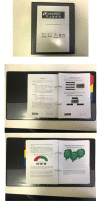An Intervention to Optimize Coach Motivational Climates and Reduce Athlete Willingness to Dope (CoachMADE): Protocol for a Cross-Cultural Cluster Randomized Control Trial
- PMID: 29375428
- PMCID: PMC5767258
- DOI: 10.3389/fpsyg.2017.02301
An Intervention to Optimize Coach Motivational Climates and Reduce Athlete Willingness to Dope (CoachMADE): Protocol for a Cross-Cultural Cluster Randomized Control Trial
Abstract
Field-based anti-doping interventions in sport are scarce and focus on athletes. However, coaches are recognized as one of the most significant source of influence in terms of athletes' cognitions, affect, and behavior. In this paper, we present the protocol for a cluster randomized control trial which aims to contrast the relative effects of a 'motivation and anti-doping' intervention program for coaches against an information-based anti-doping control program. In developing the motivation content of our intervention, we drew from Self-Determination Theory. The project is currently ongoing in Australia and has recently started in the United Kingdom and Greece. We aim to recruit 120 coaches and approximately 1200 of their athletes across the three countries. Various assessments will be taken from both coaches and athletes prior to the intervention, immediately after the 12-week intervention and at a 2-month follow up. The intervention comprises face-to-face workshops and weekly activities which are supported by printed and online material. The project aims to identify communication strategies that coaches can use to support athletes' motivation in sport and also to promote self-determined reasons for athletes to comply with doping regulations. Trial Registration: The trial is registered with the Australia and New Zealand Clinical Trials Registry (ANZCTR): ACTRN12616001688471.
Keywords: anti-doping; coach training; motivation; self-determination theory.
Figures
References
-
- Bandura A. (1997). Self-Efficacy: The Exercise of Control. New York, NY: Freeman.
-
- Barkoukis V. (2015). “Moving away from penalization: the role of education-based campaigns,” in The Psychology of Doping in Sport eds Barkoukis V., Lazuras L., Tsorbatzoudis H. (Abingdon: Routledge; ) 215–229.
-
- Barkoukis V., Lazuras L., Tsorbatzoudis H., Rodafinos A. (2011). Motivational and sportspersonship profiles of elite athletes in relation to doping behavior. Psychol. Sport Exerc. 12 205–212. 10.1016/j.psychsport.2010.10.003 - DOI
LinkOut - more resources
Full Text Sources
Other Literature Sources
Molecular Biology Databases



